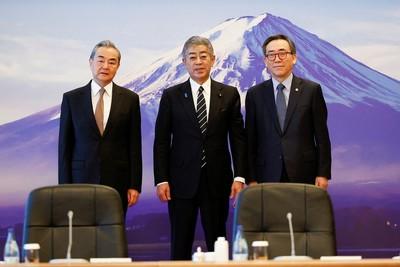
Why the China-Japan-South Korea dialogue matters to the world
Global Times
In a world increasingly shaped by fractured alliances, three Asian neighbors – China, Japan, and South Korea – have quietly revived a long-dormant trilateral dialogue. The 13th China-Japan-ROK Trilateral Economic and Trade Ministers’ Meeting was held in Seoul recently. Their foreign ministers also met in Tokyo on March 22 for the first time in four years. While no sweeping agreements emerged, this revival is profound and has significant regional and global stability implications.
As major global economies and Asia’s three most extensive powers, these nations have acknowledged a crucial reality: It is time they take an active role in shaping their regional destiny rather than leaving it in the hands of external powers.
The timing of this dialogue is no coincidence. The so-called “Indo-Pacific” has become a hotspot for Washington’s competition strategy against China. The US’ push to “de-risk” global supply chains and reduce dependence on China has brought allies like Japan and South Korea into a dilemma: lean further into US-led security or prioritize economic integration with China, their largest trading partner. Hence, the trilateral dialogue is a key factor in this complex dynamic.
Meanwhile, long-standing tensions have heightened fears of conflict in a region already burdened by history and geographic disputes.

China, Japan, and South Korea are signaling their own intent to set their course. They represent a hopeful step toward reclaiming regional agency. The three nations agreed to discuss accelerating negotiations on the trilateral free trade agreement that had been sidelined for years, demonstrating a shared interest in stabilizing supply chains amid the ongoing global uncertainty. They also pledged to deepen collaboration in digital and green economies and enhance local cooperation.
These choices reflect a pragmatic approach to a region under immense pressure. Asian stability cannot be reduced to binary options – it requires a delicate balance in which regional cooperation plays a central role.
However, reclaiming the cooperation does not imply decoupling from the US. Japan and South Korea remain deeply tied to Washington for security guarantees. Yet there is a growing perception that US strategies prioritize countering China over building proper stability in Asia.
While America positions itself as the defender of the “free world,” it offers limited solutions to the region’s pressing economic change.
The stakes are global and regional for China, Japan, and South Korea. Their cooperation is critical in addressing transnational issues such as energy security and climate resilience.
Sunday’s meeting of economic and trade ministers articulated a vision for international cooperation rooted in regional necessity rather than external influence by emphasizing multilateralism. This matters far beyond Asia. In a world splintered by nationalism and ideological divides, localized solutions open pathways for rebuilding fragmented global governance.
Still, trilateral cooperation is still influenced by the US’ deeper involvement in the region, which is a significant geopolitical factor.
Yet even modest beginnings can carry disproportionate significance. The meeting was about acknowledging a shared truth that Asia cannot rely on outside powers to shape its future.
Whether managing US-China competition, climate change, or nuclear brinkmanship, solutions imposed from the outside will fail to address Asia’s complexity, and regional stability will rely on practical and sustained cooperation among neighbors.
The meeting of China, Japan, and South Korea reminds us that diplomacy in the 21st century often looks less like dramatic breakthroughs and more like incremental progress. As the Chinese proverb goes, a journey of a thousand miles begins with a single step. This step may light the way for a more self-determined Asia.
